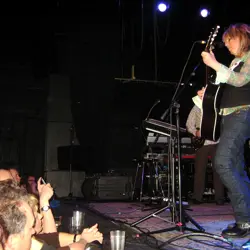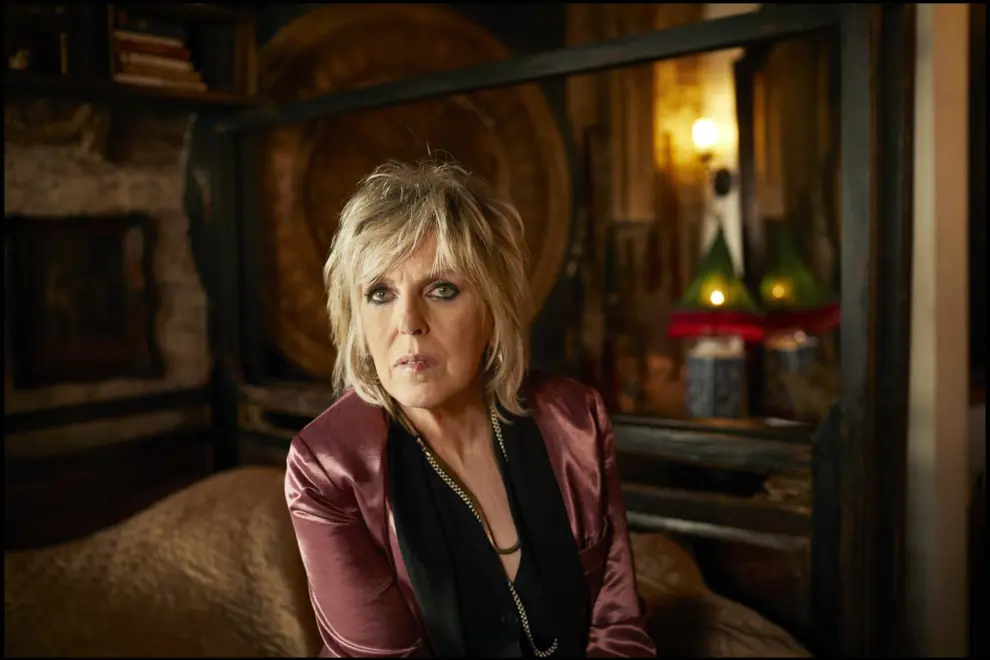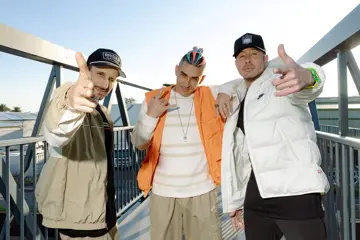 Lucinda Williams
Lucinda WilliamsThe Concert Hall at the Sydney Opera House brimmed with warmth as Lucinda Williams took us on a journey that was part memoir, part music, part cinematic immersion. The evening, titled Don’t Tell Anybody The Secrets, flawlessly delivered that hybridised lyricism where storytelling and song became inseparable, lending itself perfectly to Williams’ back catalogue.
From the moment she began, the show radiated joy and candour. A projection of old stock footage set the tone as the first chords of Blind Curly Brown resonated. Roots and memories emerged, immediately drawing the audience into Williams’ early inner world. The seasoned band filled the instrumentation with gravity and grace, elevating her resilient and vital singing with unmistakable intimacy.
She paid homage to tradition with a nod to Pete Seeger’s one-time housekeeper, Elizabeth Cotton, and her track Freight Train before reflecting on being "infatuated" with Bob Dylan. “I was in Baton Rouge while my dad was teaching at LSU… a student came with a Dylan record…it was back when it was an event to get a record…I saw the cover with a photo of a lanky young man with fluffy hair in jeans and a motorcycle jacket, and I’m smitten.”
That moment led her to Highway 61 Revisited and to the realisation that she too wanted to sing. Williams’ storytelling lent a new emotional texture to It Takes a Lot to Laugh, It Takes a Train to Cry, rich in originality and wit.
Don't miss a beat with our FREE daily newsletter
Her voice carried us through Hank Williams’ Jambalaya and the bittersweet humour of recollecting one of her first recordings, Happy Woman Blues, one of the earliest songs that mattered to her. “That to me was success: to do what you loved and make a living, I wasn’t thinking about millions of dollars.”
She spoke of Austin in the 70s, “guys with long hair were called cosmic cowboys,” with Willie Nelson as king and Townes van Zandt weaving through the scene. It was a decade of creatives with little business, but so much heart. And then came that spark when Rough Trade called from the UK. “Another lucky day.”
Homesickness surfaced in Crescent City from her self-titled album. Written for New Orleans, the song felt both wistful and celebratory. She spoke of being proud when Emmylou Harris recorded it. “Tu le ton son temps. That's what we'd say,” she laughed, referencing the Cajun French in her lines.
Her broaching of darker subject matter was disarming. “When I was starting out, people were saying my songs were too dark. I had to remind them that those early folk songs were also dark, the Irish and Scottish folk songs.” The crowd laughed and hooted when she said, “I’m like a punk folk singer. Oops.”
A tribute to her lineage emerged in the discussion of her father, a successful poet who taught her never to censor herself. That lineage threaded outward into Car Wheels On A Gravel Road, showcasing her younger self and the elusive trauma she touched upon.
She recounted how the re-recorded track won her a Grammy, but the press labelled her “the witch,” and she felt that sting until her father saw her at the Bluebird and said, “I’m sorry. You were the little girl.” That moment “blew my mind because I didn’t realise I was singing about myself.”
For Bus to Baton Rouge, she unpacked memories of grandparents, her mother’s mental health struggles and the fig tree in the backyard. Rich in vivid and specific imagery: Chewing tobacco, banana pudding, coffee grounds and eggshells as fertiliser. “Did you know about that? See, we’ve all got something in common all around the world.”
Little Angel, Little Brother came next, dedicated to her younger sibling who used to go missing for weeks. “He plays piano under the name Walking Bob. If you go down to New Orleans and see him play, tell him he needs to get himself home, tell him his sister loves him.”
The set turned poetic and elegiac with a tribute to the poet Frank Stanford, and Lake Charles, named for Clyde, who was “smart as a whip, talented, a little self-destructive.” Blaze Foley emerged next in Drunken Angel, a hellraiser whose life ended tragically. She closed that segment simply: “Success was a long time coming, and this is about that”: Fruits of My Labor.
A quick aside had her spraying herbal spray. “Allergy season… hippie stuff.” Then, with clear admiration, she mentioned Amos Lee recording her songs, especially Fruits…
Later, a holy blues number inspired by her mother and longing for a heaven reunited in Heaven Blues. Dust, born from her father’s poem, showed where “I got my flair for darkness.” And with Ghost of Highway 20, she returned to the road, to movement, to searching.
As the night wound down with Where The Song Will Find Me, Williams reflected: “Since the age of 12, when I picked up the guitar, songs have come to me.” And in a final spirited flourish, she launched into Get Right With God, a hootenanny brimming with Old Testament imagery. The crowd clapped along until she paused, grinning: “Hang on, I gotta introduce it.” And how fitting, a final blessing, shared with the audience.
Theatre lights, projections and a tight band made this hybrid performance cinematic without losing the flicker of lived truth. It was part concert, part memoir, part cinema in the round, and full of joy, candour and resilience. Stories of love, loss, family, friendship, dancing in dust, finding light in the dark. That was the alchemy onstage brewed up by this indefatigable Southern flame.
















